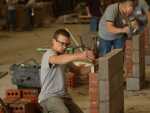Some FSCC fees going up slightly; Despite the increases, college is still among the least expensive.

Some student fees at Fort Scott Community College will increase slightly next year following recent approval by the FSCC Board of Trustees.
Trustees approved proposed tuition, course and program fees and dorm fees for the 2011-12 school year during their Feb. 28 meeting. Proposals included small increases in some fees next year, and the addition of some fees that are not in place this year. Students will pay $2 more per credit hour next year, and some students will pay slightly higher fees associated with certain programs.
FSCC President Clayton Tatro said college administrators were able to determine through a study conducted about a year ago that small increases in some fees next year were necessary to keep the college competitive with other similar institutions.
Tatro said that even with those increases, he is pleased with the fact that student expenses at the college remain affordable and is "proud" there will only be a small increase in fees per credit hour next year.
"When looking at tuition and fees, we were concerned about keeping fee costs down for students," he said. "We've worked to keep tuition and fee costs down. We want to continue to remain competitive."
The results of the analysis comparing tuition and fees at community colleges across the state showed that the combined cost of tuition and fees per student at FSCC -- which is currently $79 for in-state, in-district students -- is less than a majority of colleges included in the study, Tatro said.
"I'm pleased we're able to maintain costs and keep costs low for students," he said.
The study also showed that FSCC ranked No. 6 out of 19 community colleges in Kansas in terms of cost of tuition and fees.
"Which means we're less expensive than 13 of the 19 community colleges," Tatro said, adding he didn't have figures or rankings for the 2011-12 school year as many community colleges have not set their tuition and fee rates for next year. "I think we'll be fairly competitive to where we were last year in terms of comparison to other community colleges."
Most of the increase in fees per credit hour will go toward student technology and will cover the rising cost of classroom materials and supplies, Tatro said.
"The vast majority (of the increase) will go back to student technology," he said. "We're essentially covering the increased cost of those (materials and supplies)."
An additional fee that will be implemented next year is a $20 graduation testing fee that the board approved a few months ago. The fee will be for a new exit assessment students will take as they graduate, Tatro said.
Other added fees next year include small charges for supplies and materials in the agriculture and construction trades programs. There will also be increases in lab fees -- from $250 to $285 -- for the emergency medical technician program and an added $50 state certification application fee and $100 practical skills examination fee for the EMT program.
The cost of the kit needed for the cosmetology program will increase from $900 to $1,100 next year, but Tatro said this is a "pass-through cost to students" and is "of no profit to the college."
"The college puts the kit together at cost," he said. "Students are basically paying the college for the cost of the kit."
Other fee hikes next year include an increase in the ALH Insurance fee from $15 to $20, an increase in the nursing program and lab fee from $350 to $415, an increase in student fees for the Harley-Davidson program from $50 to $65, and an increase in the six-week meal plan for the truck driving program from $350 to $375, according to an FSCC document.
Tuition costs for all students will remain the same next year. Students who hail from Bourbon County or anywhere else in Kansas will pay the current rate of $44.
College officials have not had to increase tuition due to enrollment increases the last two years which have helped the college offset cuts in state funding. Enrollment is up 4 percent this year and increased by 12 percent last year at FSCC.
"We've had 13 percent in cuts the last two years," Tatro said.
